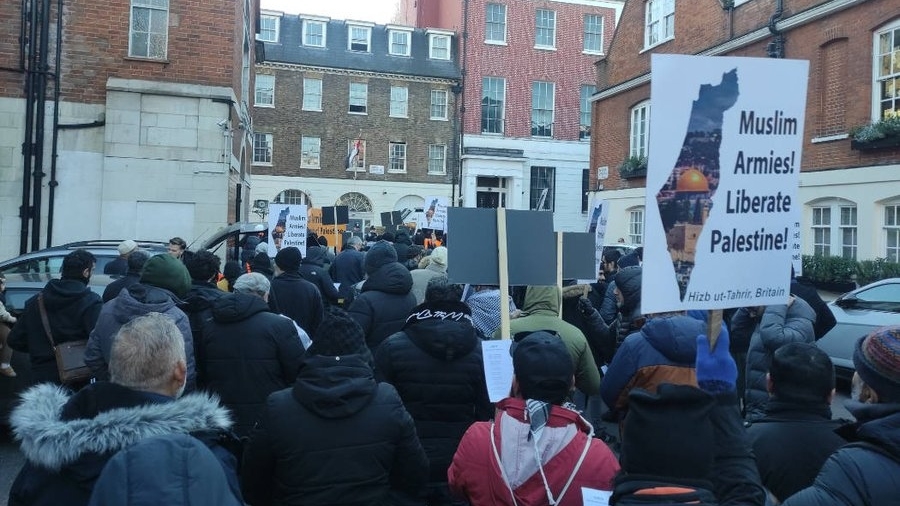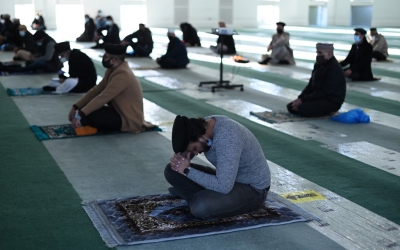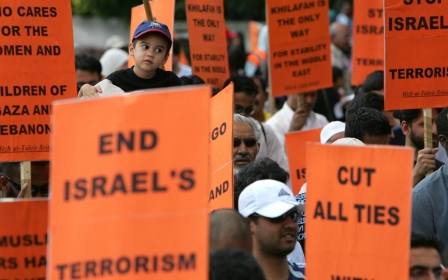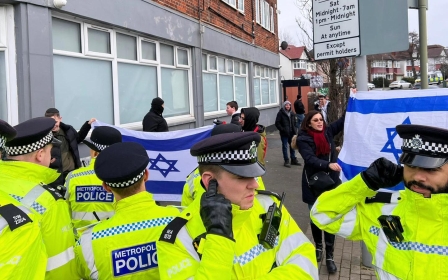Hizb ut-Tahrir ban: British MPs vote to add Islamic group to terrorism list

British MPs have approved the proscription of Hizb ut-Tahrir as a terrorist organisation, following Home Secretary James Cleverly's announcement earlier this week that the government would ban the Islamic political party.
The ban was also approved on Thursday by the House of Lords, the UK parliament's upper house, and will come into force from midnight on Friday.
Speaking in the House of Commons, Tom Tugendhat, the security minister, described Hizb ut-Tahrir as an “antisemitic” group which he said had praised the 7 October attacks by Hamas in southern Israel.
“Hizb ut-Tahrir responded to the murder of civilians with elation instead of condemnation. They lavished Hamas with praise,” said Tugendhat.
“Hizb ut-Tahrir has antisemitism at its very core. They reject democracy and engage in vile homophobia as an organisation. They don’t just reject British values. They seek to undermine them.”
New MEE newsletter: Jerusalem Dispatch
Sign up to get the latest insights and analysis on Israel-Palestine, alongside Turkey Unpacked and other MEE newsletters
All parties in the Commons backed the government’s motion, which was passed without opposition after a brief debate.
Responding to Tugendhat, Dan Jarvis, Labour’s shadow security minister, said: “Proscribing Hizb ut-Tahrir is the right thing to do for our national security. For too long the public have been exposed to their extremist ideology, their glorification of terrorist activity and their core aim of overthrowing our democratic system of government to replace it with an Islamist theocracy.”
The ban was supported by the Scottish National Party and the Liberal Democrats. Both parties and Conservative backbench MPs also called on the government to proscribe Iran’s Islamic Revolutionary Guard Corps (IRGC).
Addressing those calls, Tugendhat said: “The reality is what we are seeing is a pattern of violence that has spread out of Tehran over many decades.”
But he added: "It would be wrong of me to comment on proscription options that we may be holding in reserve."
Hizb ut-Tahrir has faced criticism for holding its own demonstrations about the war in Gaza often on the fringes of separate, mass protests in London calling for a ceasefire.
It has also organised demonstrations outside the embassies of some Muslim-majority countries, including Egypt and Turkey.
Shortly after Israel went to war on Gaza, the group called on armies in Muslim countries to "remove the Zionist occupiers".
In October, the Metropolitan Police said it had reviewed footage of a man chanting "Jihad, jihad" during a Hizb ut-Tahrir demonstration, but assessed that no offences had been committed.
Tugendhat added that the banning order now means that anyone found supporting Hizb ut-Tahrir could face up to 14 years in prison.
'A sign of desperation'
British governments have long considered options to outlaw or restrict Hizb ut-Tahrir's activities. Former Prime Minister David Cameron tried to ban the group while he was in office, but was advised to back down by the UK's counterterrorism legislation watchdog.
The group, whose name translates as The Islamic Liberation Party, was established in Jerusalem in 1953 and says that it uses non-violent means to achieve its goal of a caliphate in Muslim lands.
Hizb ut-Tahrir, also known as HT, is banned in Middle Eastern countries such as Saudi Arabia, but is active in dozens of others, including Kuwait, Tunisia, Lebanon, India, Kenya, Australia and the United States.
In a statement, Hizb ut-Tahrir said it "completely refutes any idea that it is anti-semitic or encourages terrorism".
'Hizb ut-Tahrir Britain explicitly states that it will challenge the proposed proscription using all available legal means'
– Statement by Hizb ut-Tahrir
"Hizb ut-Tahrir has a record of over 70 years of following a method of non-violent political activity against despots who rule the Muslim world with the West’s approval. In its work to establish the Islamic Khilafah [caliphate], Hizb ut-Tahrir has never resorted to any sort of violence or armed struggle," it said.
"Hizb ut-Tahrir Britain explicitly states that it will challenge the proposed proscription using all available legal means," it added.
In a statement on Thursday, a number of prominent imams and scholars in the UK criticised the ban and called on the government to reconsider the proscription and engage in "open dialogue".
"This represents a severe assault on the fundamental freedoms of speech, association and belief and is a clear infringement of civil liberties," they said.
Noting that Cleverly appeared to have "turned a blind eye" to British nationals returning to the UK after fighting for the Israeli army in Gaza, they said: "Instead of addressing this, the Home Secretary's decision to proscribe Hizb ut-Tahrir appears to be steering the UK toward an alarming trajectory of authoritarianism."
Former British Ambassador to Uzbekistan Craig Murray, who was once part of a formal review that looked into banning the group, called the government's decision "ridiculous".
He pointed out that the UK has investigated the group for 25 years and "the conclusion every time was that [Hizb ut-Tahrir] has a philosophy of non-violence and therefore should not be banned".
Middle East Eye delivers independent and unrivalled coverage and analysis of the Middle East, North Africa and beyond. To learn more about republishing this content and the associated fees, please fill out this form. More about MEE can be found here.





